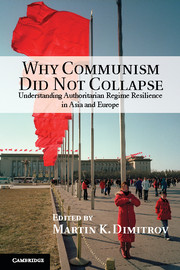Book contents
- Frontmatter
- Contents
- Tables and Figures
- List of Contributors
- Acknowledgments
- Abbreviations
- Part I Reform and Resilience
- Part II Ideology and Resilience
- Part III Contagion and Resilience
- 5 Bringing Down Dictators
- 6 The Dynamics of Diffusion in the Soviet Bloc and the Impact on Regime Survival
- Part IV Inclusion and Resilience
- Part V Accountability and Resilience
- Miscellaneous Bibliography
- General Bibliography
- Index
- References
6 - The Dynamics of Diffusion in the Soviet Bloc and the Impact on Regime Survival
Published online by Cambridge University Press: 05 August 2013
- Frontmatter
- Contents
- Tables and Figures
- List of Contributors
- Acknowledgments
- Abbreviations
- Part I Reform and Resilience
- Part II Ideology and Resilience
- Part III Contagion and Resilience
- 5 Bringing Down Dictators
- 6 The Dynamics of Diffusion in the Soviet Bloc and the Impact on Regime Survival
- Part IV Inclusion and Resilience
- Part V Accountability and Resilience
- Miscellaneous Bibliography
- General Bibliography
- Index
- References
Summary
This book explains why some communist regimes collapsed, whereas others – China, Cuba, North Korea, Laos, and Vietnam – withstood the revolutionary upheavals of 1989–1991. To understand why these five communist regimes survived when so many others perished, we need to examine the factors and processes that led to the demise of communism in Eastern Europe, Mongolia, and the Soviet Union but did not end communist rule elsewhere. One crucial element in the downfall of communist regimes was the process of international “diffusion,” a topic I will be exploring in this chapter.
The chapter begins by briefly explaining why the spillover of political change and turmoil from one country into another played such an important role in the collapse of the Soviet and allied communist regimes. The chapter then specifies how the concept of “diffusion” has been elaborated by scholars of varying perspectives (realist, liberalist, constructivist) and applied to various geographic and temporal contexts, not just to the Soviet bloc in 1989–1991. Using this framework, the chapter distills several points about the process of diffusion that linked the Soviet Union, Eastern Europe, and Mongolia in the late 1980s and beginning of the 1990s. The concluding section explains why this process did not destabilize the resilient communist regimes. The Chinese regime did experience significant effects of diffusion in the spring of 1989 with the emergence of the Tiananmen Square protests, but the threat to the regime’s survival was abruptly eliminated in early June 1989 when the Chinese Politburo ordered troops to open fire on serried crowds of demonstrators, killing vast numbers. If the Chinese authorities had not brutally crushed the Tiananmen Square unrest, diffusion from the Soviet bloc might well have extended further, potentially undermining some of the resilient communist regimes. The decisive crackdown in Beijing not only solidified Chinese communist rule but also kept the process from subverting any of the other communist regimes outside the Soviet orbit.
Information
- Type
- Chapter
- Information
- Why Communism Did Not CollapseUnderstanding Authoritarian Regime Resilience in Asia and Europe, pp. 149 - 182Publisher: Cambridge University PressPrint publication year: 2013
References
Accessibility standard: Unknown
Why this information is here
This section outlines the accessibility features of this content - including support for screen readers, full keyboard navigation and high-contrast display options. This may not be relevant for you.Accessibility Information
- 2
- Cited by
